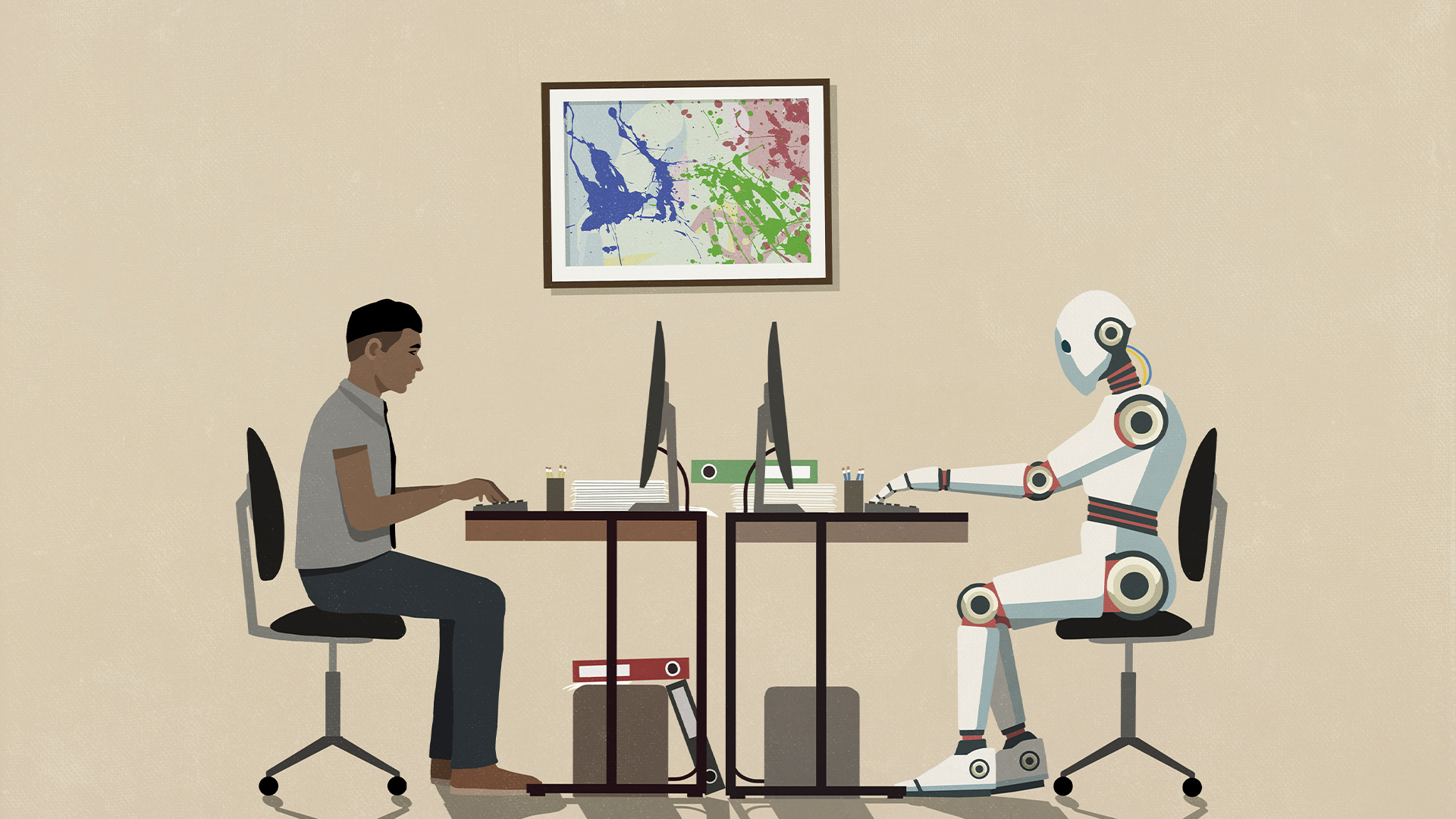Women are three times more likely to lose jobs to AI – here are the roles facing the biggest threats
Roles dominated by women are three times more likely to be replaced or transformed by AI than those traditionally held by men


Generative AI is three times more likely to impact the jobs of women in the workplace than men, according to new research.
A study from the UN's International Labour Organization (ILO), which created an index of occupational exposure of risk of replacement or transformation to jobs by AI, revealed the potential impact of the rise of the technology.
The research predicted that one-in-four jobs will be impacted by AI. However, it's more likely that jobs will be transformed in most cases rather than merely replaced, though that is a risk in some instances.
Women are more likely to feel the impact of AI in the workforce, highlighting concerns that AI will widen existing inequities.
"In high-income countries, jobs at the highest risk of automation make up 9.6% of female employment — a stark contrast to 3.5 per cent of such jobs among men," the report noted.
The study broke down jobs into different "exposure gradients", revealing the roles with the "highest" and "significant" potential risk of automation or transformation from generative AI.
Notably, female employment is more concentrated in the top two exposure gradients, with 5.7% of female roles rated to have significant exposure and another 4.7% rated to have the highest exposure.
Sign up today and you will receive a free copy of our Future Focus 2025 report - the leading guidance on AI, cybersecurity and other IT challenges as per 700+ senior executives
"This tool helps countries across the world assess potential exposure and prepare their labor markets for a fairer digital future," said Janine Berg, Senior Economist at the ILO, in a statement.
The concerns about AI and the impact on women in the workforce isn't new. A quarter of workers surveyed last year said they feared AI would drive women out of the workplace.
Similarly, research from earlier this year revealed women were half as likely as their male counterparts to feel confident and prepared to adapt to AI, with Coursera research showing women made up less than a third of those taking AI skills training.
Full automation remains limited
While some jobs may be at risk of full automation, that remains limited, the ILO report noted, mainly because most tasks still require human involvement.
Jobs at high risk of full automation included data-entry clerks, typists, and statistical or finance clerks, as well as bookkeeping clerks and financial analysts. Software developers were also listed as having significant exposure to AI.
Meanwhile, jobs at a low risk of automation include cleaners, garbage collectors, creative performers, and dentists, among others.
"Clerical jobs face the highest exposure of all, due to GenAI’s theoretical ability to automate many of their tasks," the ILO said in a statement. "However, the expanding abilities of GenAI result in an increased exposure of some highly digitized cognitive jobs in media-, software- and finance-related occupations."
Because of that, the report noted around a quarter of global employment is exposed to generative AI, but that rises to 34% in high-income countries. However, that includes nearly all jobs with any potential risk from AI, including those found to have "low exposure".
For jobs in the top two exposure gradients, those facing the "highest" and "significant" impact, the report found 7.5% would be affected globally, versus 17.1% in higher income countries and 1.1% in lower income countries.
Broken down by geography, the areas facing the most change from AI, be it job replacement or transformation, were Europe and Asia followed by the Americas.
"This index helps identify where GenAI is likely to have the biggest impact, so countries can better prepare and protect workers," said Marek Troszyński, Senior Expert at Poland’s National Research Institute (NASK) and one of co-authors of the paper.
MORE FROM ITPRO
Freelance journalist Nicole Kobie first started writing for ITPro in 2007, with bylines in New Scientist, Wired, PC Pro and many more.
Nicole the author of a book about the history of technology, The Long History of the Future.
-
 What is Microsoft Maia?
What is Microsoft Maia?Explainer Microsoft's in-house chip is planned to a core aspect of Microsoft Copilot and future Azure AI offerings
-
 If Satya Nadella wants us to take AI seriously, let’s forget about mass adoption and start with a return on investment for those already using it
If Satya Nadella wants us to take AI seriously, let’s forget about mass adoption and start with a return on investment for those already using itOpinion If Satya Nadella wants us to take AI seriously, let's start with ROI for businesses
-
 Lloyds Banking Group wants to train every employee in AI by the end of this year – here's how it plans to do it
Lloyds Banking Group wants to train every employee in AI by the end of this year – here's how it plans to do itNews The new AI Academy from Lloyds Banking Group looks to upskill staff, drive AI use, and improve customer service
-
 CEOs are fed up with poor returns on investment from AI: Enterprises are struggling to even 'move beyond pilots' and 56% say the technology has delivered zero cost or revenue improvements
CEOs are fed up with poor returns on investment from AI: Enterprises are struggling to even 'move beyond pilots' and 56% say the technology has delivered zero cost or revenue improvementsNews Most CEOs say they're struggling to turn AI investment into tangible returns and failing to move beyond exploratory projects
-
 Companies continue to splash out on AI, despite disillusionment with the technology
Companies continue to splash out on AI, despite disillusionment with the technologyNews Worldwide spending on AI will hit $2.5 trillion in 2026, according to Gartner, despite IT leaders wallowing in the "Trough of Disillusionment" – and spending will surge again next year.
-
 A new study claims AI will destroy 10.4 million roles in the US by 2030, more than the number of jobs lost in the Great Recession – but analysts still insist there won’t be a ‘jobs apocalypse’
A new study claims AI will destroy 10.4 million roles in the US by 2030, more than the number of jobs lost in the Great Recession – but analysts still insist there won’t be a ‘jobs apocalypse’News A frantic push to automate roles with AI could come back to haunt many enterprises, according to Forrester
-
 Businesses aren't laying off staff because of AI, they're using it as an excuse to distract from 'weak demand or excessive hiring'
Businesses aren't laying off staff because of AI, they're using it as an excuse to distract from 'weak demand or excessive hiring'News It's sexier to say AI caused redundancies than it is to admit the economy is bad or overhiring has happened
-
 Lisa Su says AI is changing AMD’s hiring strategy – but not for the reason you might think
Lisa Su says AI is changing AMD’s hiring strategy – but not for the reason you might thinkNews AMD CEO Lisa Su has revealed AI is directly influencing recruitment practices at the chip maker but, unlike some tech firms, it’s led to increased headcount.
-
 Accenture acquires Faculty, poaches CEO in bid to drive client AI adoption
Accenture acquires Faculty, poaches CEO in bid to drive client AI adoptionNews The Faculty acquisition will help Accenture streamline AI adoption processes
-
 Productivity gains on the menu as CFOs target bullish tech spending in 2026
Productivity gains on the menu as CFOs target bullish tech spending in 2026News Findings from Deloitte’s Q4 CFO Survey show 59% of firms have now changed their tune on the potential performance improvements unlocked by AI.
